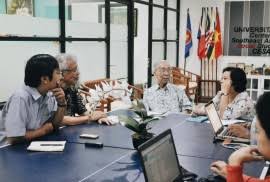
Social science has a central position and power to understand social problems, organize the bureaucracy, organize the economy, regulate policies and public communications in support of community life both in regional and global. The problems of social imbalances, multiculturalism, religiosity, racial intolerance, marginalities, practical politics, human trafficking , regional and global power relations, migrant workers, and social aspects of disaster need clear social-humanities academics to understand and provide referrals to policy makers (quoted from Terms of Reference).
The problem is that Indonesia as a developing country still desperately needs help from experts and scientists to do development, especially in the field of physical infrastructure, the ones that are seen to be more able to give practical contribution to society. Without realizing it, the government requires development in physical form and ignores the social infrastructure. Thus, the more days pass, social science seemed increasingly disregarded. It indicates that the government has not looked further into contribution of social-humanities sciences based research.
Center for Southeast Asian Social Studies (CESASS) UGM, supported by Ministry of Research, Technology, and Higher Education, as the Center of Science and Technology in the social field must surely question the waiver of this social sciences. Thus, CESASS invited social scientists to discuss their own discipline and even cross the boundaries of their discipline to attend Series Discussion II titled “Social Sciences: Its Roles and Challenges” (13/02/2018). Prof. Sjafri Sairin & Prof. Djoko Suryo, the head of CESASS, Dr. Phil Hermin Indah Wahyuni, along with other researchers from CESASS namely Muhadi Sugiono, M.A., Dr. Phil. Vissia Ita Yulianto, Putu Yogi Paramitha, M.H., Fatkurrohman, M.Si, and two students of the doctoral program of Department of Public Policy and Management UGM discussed the social science roles and challenges in this era.
